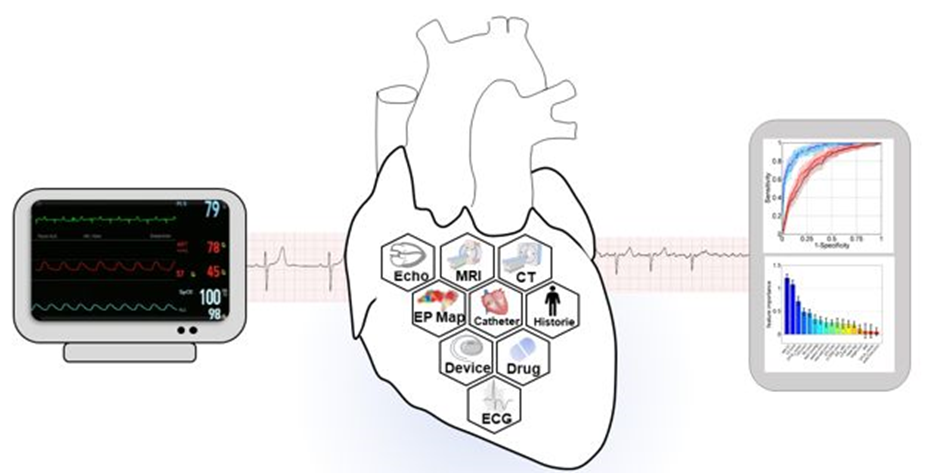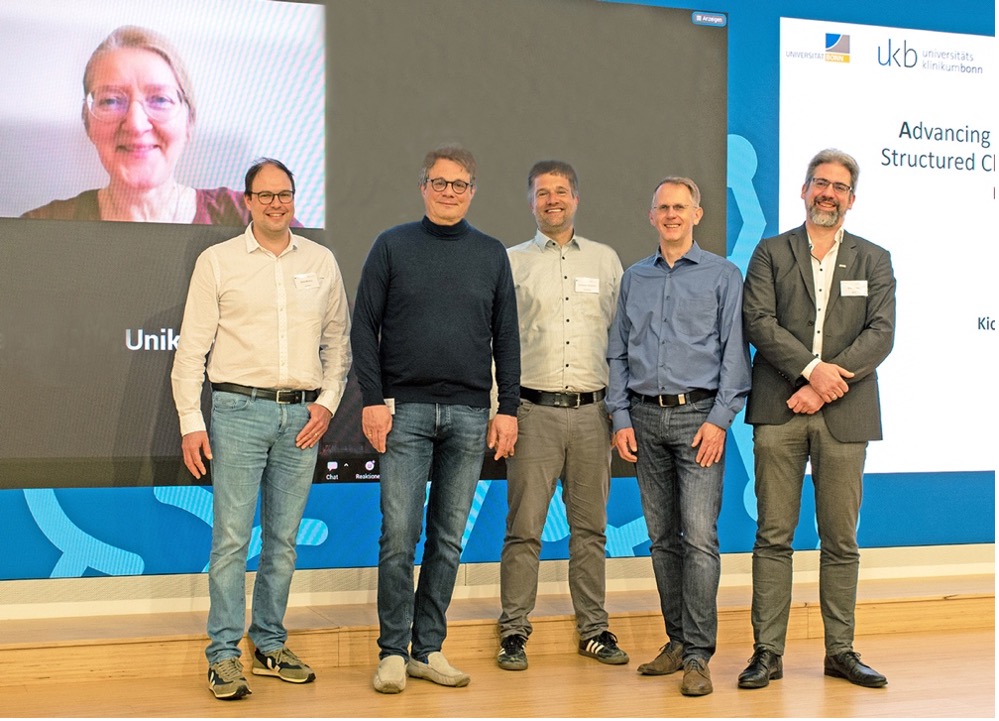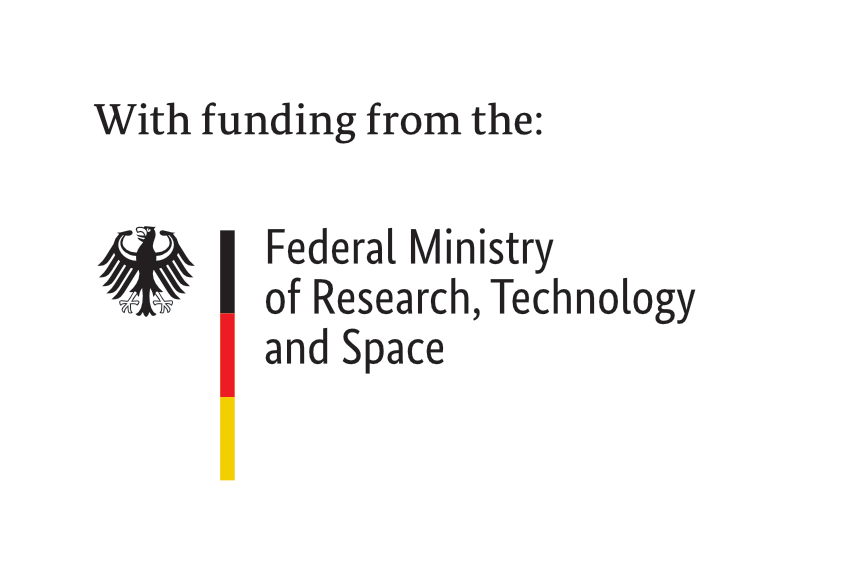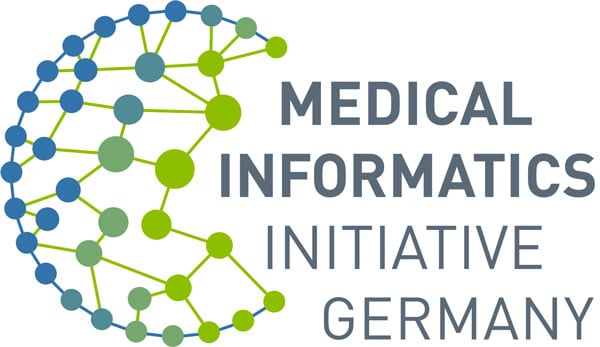Use Case ACRIBiS
Personalized risk assessments for cardiovascular disease
15 research institutions work together to advance the digitization of health research in Germany. Coordinated by the University Hospital Bonn (UKB), 15 research institutions in Germany will further develop risk assessment for cardiovascular diseases, which is very important for prevention, diagnostics and therapy, in the project "Advancing Cardiovascular Risk Identification with Structured Clinical Documentation and Biosignal Derived Phenotypes Synthesis (ACRIBiS)".

This project, which is a use case of the Medical Informatics Initiative (MII) of the German Federal Ministry of Education and Research (BMBF), brings together clinical information and biosignals, such as the ECG, using modern IT processes in order to better assess patient-specific risks of cardiovascular diseases. Patients in particular should benefit from this, as not only can prevention, diagnostics and therapy be better controlled in the long term, but individualized risk information is also made available to patients. To this end, the university hospitals at the core sites in Bonn (overall coordination), Hanover (co-coordination), Würzburg (co-coordination), Heidelberg, Göttingen and Munich, together with the implementation partners in Berlin, Dresden, Essen, Freiburg, Kiel, Mainz, Münster and Ulm, as well as the Carl Thiem Hospital in Cottbus, are initially collecting standardized data from 4,500 patients in the course of routine care and questioning them about the development of their health status. On this basis, increasingly better personalized risk estimation methods are being jointly developed.
PD Dr. Sven Zenker
ACRIBiS-Coordinator, Medical Director Staff Unit Medical-Scientific Technology Development and Coordination (MWTek) and Head of the Applied Medical Informatics (AMI) Working Group at the Institute of Medical Biometry, Informatics and Epidemiology (IMBIE) at UKB.
"I consider it particularly exciting that in this project we are concertedly addressing several challenges that are absolutely central to the development of a dynamic, evidence-based and data-driven learning healthcare system: Optimizing and standardizing clinical documentation to make patient care and research even more effective and efficient, as well as building technologies that make even highly complex data analyses, as is common in the biosignal field, widely available in near-real time, and finally, merging these data sources and analysis methods into testable predictive models that focus on patient-centered outcomes that we collect in a structured way for this purpose. If we solve these challenges together, we will have created a process model that can significantly improve patient care and medical research far beyond the boundaries of cardiovascular medicine."
In doing so, ACRIBiS is breaking new ground in Germany, but also internationally, as the participating cardiology clinics not only want to collect study-specific data together, but have also decided to standardize and structure their routine clinical documentation across all partner sites in such a way that it is better suited for automated risk estimation. This is already very important in cardiology patient care, but until now has had to be done by manual recording and calculation. This innovation will not only contribute to facilitating clinical work, but also create a new dataset that is comparable across sites and will support the advancement of cardiovascular science beyond the boundaries of ACRIBiS.

Prof. Bernd Weber
Dean of the Medical Faculty Bonn
"Digitization can help significantly improve our healthcare system if it is used properly. I am very pleased that Bonn is coordinating this highly innovative large-scale project, which can take on a lighthouse function in the development of a digital and procedural medical infrastructure that, in the interaction of many sites, enables rapid and effective scientific use of patient data, which also has a direct impact on patient care and at the same time improves patient involvement."
Individualized, interactive risk assessment planned via app
These structured, standardized clinical data are further enriched with results from automated analyses of biosignals such as the electrocardiogram (ECG). This combination is expected to improve the predictive power of risk estimates derived from clinical data or biosignals alone, which is one of the core scientific goals of ACRIBiS. In the later course of the project, an individualized, interactive risk assessment via app will also be made possible for the patients themselves - an important contribution to the development of risk awareness.
The ACRIBiS project makes use of the infrastructure established within the framework of the MII and the BMBF's Network of University Medicine (NUM), without which the project goals could not realistically be achieved in this form. Among other things, ACRIBiS relies on the use of the Broad Consent of the MII to enable patients to make a transparent decision about their participation in this project. ACRIBiS leverages the sites' Data Integration Centers (DIZ) for data processing and, finally, an evolution of the NUM Dashboard (https://coronadashboard.ukbonn.de) for centralized monitoring of patient recruitment and investigation of the predictive power of risk models. These shared infrastructures will be enhanced by ACRIBiS to include capabilities for automated, near-real-time biosignal processing. Once this is technically implemented, however, the benefits will not be limited to cardiovascular diseases, but can also be transferred to other disciplines. The BMBF is funding this project with a total of just over nine million euros over a funding period of four years.

The ACRIBiS management board of the six core sites:
(from left to right) Prof. Dagmar Krefting (in ZOOM) from the University Medical Center Göttingen (UMG), Dr. Eimo Martens from the Technical University of Munich (TUM), Prof. Peter Heuschmann from the University Hospital Würzburg (UKW), Prof. Christoph Dieterich from the University Hospital Heidelberg (UKHD), Prof. Udo Bavendieck from the Hannover Medical School (MHH) and PD Dr. Sven Zenker from the University Hospital Bonn (UKB).
Photo credit: University Hospital Bonn / Katharina Wislsperger
Contact
PD Dr. Sven Zenker
University Hospital Bonn
Prof. Dr. Peter Heuschmann
University Hospital Würzburg
Prof. Dr. Dagmar Krefting
University Medical Center Göttingen
Prof. Dr. Christoph Dieterich
University Hospital Heidelberg
Dr. Eimo Martens
Technical University of Munich
Prof. Dr. Udo Bavendieck
Hannover Medical School


